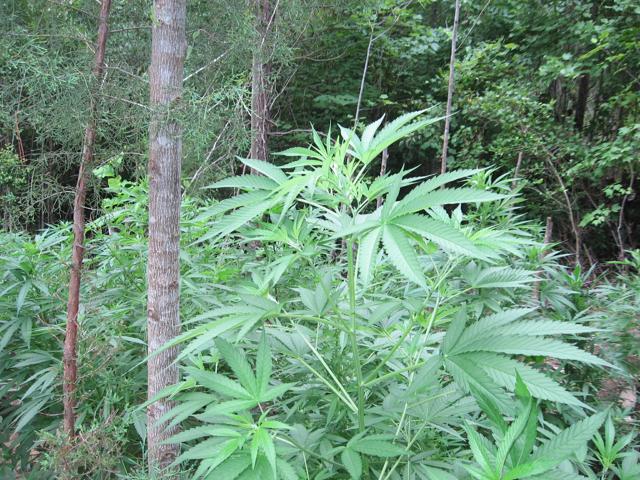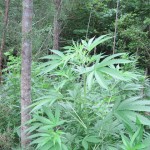- Surreptitious green: The National Forests of North Carolina recently sought to highlight the cultivation of marijuana on the public forests here, and suggests what unwitting visitors should do if they encounter a growing area. photos courtesy of the National Forests of North Carolina
- Not your average gardeners: Ammunition was found at an illegal growing site in the Uwharrie National Forest in the piedmont of North Carolina. Marijuana growers may be armed, say forest officials.
Most visitors to our national forests probably worry about things like getting lost or perhaps having a close encounter with a snake or bear, but a May 26 news release from the National Forests of North Carolina calls attention to another potential hazard:
“While only a fraction of the National Forest System lands are affected by illegal marijuana cultivation, the Forest Service believes that the safety risks are real, and visitors and employees should be informed about them,” the release states.
It goes on to list some clues that might help innocent hikers spot a growing site:
• Odor: On hot days, sometimes marijuana smells like a skunk.
• Hoses or drip lines located in unusual or unexpected places.
• A well-used trail where there shouldn’t be one.
• People standing along roads without vehicles present, or in areas where loitering appears unusual.
• Camps containing cooking and sleeping areas with food, fertilizer, weapons, garbage, etc.
• Small propane bottles (used to avoid the detection of wood smoke).
• Individuals armed with rifles out of hunting season.
The release also emphasizes the damage marijuana cultivation can inflict on native forest ecosystems, citing the “impact on supplies of public drinking water for hundreds of miles.”
But when queried about the evidence of those impacts compared with, say, the timber program, with its well-documented impacts due to road building, stream crossings and habitat alteration, agency officials drew back from that charge.
“Generally, the damage to the ecosystem would be through local impacts to soil and water,” says botanist Gary Kauffman. “And depending on the seed mix, growers could be introducing pathogens and invasive plant species into an area where they wouldn’t normally be.”
But when it comes to long-term ecological impacts, there’s really no comparison. “Building a road,” notes Kauffman, involves “much more soil disturbance, whereas the soil disturbance is much more localized for an individual pot patch. For the most part, they’re fairly small.”
Kauffman cites a couple of instances where water from a local stream had been diverted to a marijuana-planting area. “The first [botanical] survey I did, during my first week on the job, I found a marijuana patch,” he recalls. Since then, however, “I’ve only seen remnant sites — locations where they’ve already pulled out, leaving the pots and [irrigation] pipes and other debris.” If there’s been an obvious change in the hydrology, reclamation of such sites would involve measures to restore the soil and water, Kauffman explains.
Last year, the agency found a large marijuana-growing site in the Pisgah National Forest near Hot Springs, confiscating more than 30,000 plants, Public Affairs Officer Stevin Westcott reports. But such sites are rare, he says, though there has been “an expansion of this element” in the eastern U.S.
And while marijuana cultivation might have some small consequences, “Folks here are not really aware of any long-term ecological effects,” Westcott confirms. “Southern forests are very resilient.” In fact, he notes, “The effects of the camping are probably more severe than the actual growing.” In one case, some growers camped in a remote area “for about four months, poaching wildlife and diverting water out of the stream; their fires got out of hand and started a wildfire, which is how they were discovered.
“The reason the news release was issued,” he continues, “is that we’re trying to alert folks to the safety issue. It is something people need to be aware of” — not in heavily used places like Bent Creek, but more in outlying areas.
The key issue, says Westcott, is the possibility that the growers may be armed — and they may view discovery as a threat. “We want people to be safe and to be aware of their surroundings,” he emphasizes.
“Some folks question whether pot growers would harm anyone,” adds Westcott. “It’s important for people to understand that … it’s not necessarily a local person; increasingly, there’s been an organized element, and some of those people are armed.”
— Send your environmental news to Susan Andrew, 251-1333, ext. 153, or sandrew@mountainx.com.





So is there a map I could buy telling me where these plants are? You know, so I can, uh, avoid them next time I go hiking.
If the map also includes the nearest places to buy Cheetos or Chex Mix, that would be super.
Why doesn’t the Federal Government just repeal their criminalization of this plant, which would effectively end the over-pricing that makes these sorts of illegal patches on public land an issue?
In other words; the only reason it could be worth someone’s time to set up pot farms deep in the woods is because criminalization artificially inflates the price to highs (he he) that make such operations worth while.
Decriminalization would end the profit motive.
“We hold these truths to be self-evident, that all men are created equal, that they are endowed by their Creator with certain unalienable Rights, that among these are Life, Liberty and the pursuit of Happiness.”
Unless you smoke weed.